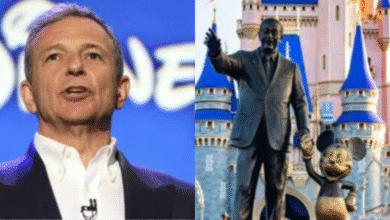Disney Company Faces Challenges as Stock Prices Continue To Fall
Disney is facing some hard times on Wall Street.

Related: Major Union Victory for Disney Workers – Here’s How It Affects Theme Park Visitors
The Walt Disney Company is currently facing significant challenges on Wall Street, as its stock price has recently dropped to a record low for 2025, hitting $103.90. This downturn marks the lowest price since the tumultuous November 2024. The stock had shown some promise last March, reaching an impressive $122, a level not observed since April 2022.
However, the latter part of the year saw a steep decline, with the stock dropping under the $90 mark for several consecutive days. Despite a gradual recovery that brought some optimism, the recent fall indicates that Disney remains vulnerable to ongoing market pressures.
Several factors have contributed to this decline. While part of the issue stems from general market volatility, leadership changes and restructurings within the company hint at deeper concerns influencing investor confidence. Analysts suggest that external macroeconomic factors are also playing a significant role, potentially exacerbating the company’s struggles in a competitive industry.
Macroeconomic Factors Affecting Disney

Related: Popular Theme Park to Remove Animal Entertainment After Decades of Backlash
One of the more discernible influences on Disney’s stock prices appears to be tied to President Trump‘s tariff proposals, which have created ripples throughout the U.S. economy. These tariffs have implications not just for Disney, but for numerous other companies as well.
As various sectors grapple with rising operational costs and supply chain disruptions, the entertainment and theme park industries are no exception. The uncertainty surrounding these proposals leaves many investors wary, and companies like Disney find themselves in a precarious position.
The widespread impacts of these tariffs could alter the landscape for Disney significantly. If the proposals remain in place, they may lead to increased costs for productions and park operations, potentially squeezing margins. The long-term effects could leave lasting scars on Disney’s financial health and business strategies, impacting not only stock prices but the company’s overall market performance.
Despite the challenges on the financial front, 2025 holds promise for the Walt Disney Company with several anticipated projects slated for release. Among the most notable are various films in the Marvel Cinematic Universe, including Captain America: Brave New World. While this film is expected to generate excitement among fans, its success will depend heavily on audience reception.
Additionally, Disney is set to release a highly anticipated yet controversial live-action adaptation of Snow White, starring Rachel Zegler. These releases are integral to the company’s strategy, as they seek to draw audiences back to theaters amidst shifting viewing habits and economic pressures. The outcome of these films could be pivotal not just for Disney’s reputation, but also for its financial recovery following the most recent downturn.
In tandem with its cinematic endeavors, Disney is also focusing on major theme park developments. The Magic Kingdom is expected to see substantial transformations as manmade waterways are set to be paved over in favor of a new area inspired by Pixar’s Cars franchise. This ambitious change reflects Disney’s intention to innovate and refresh its offerings, hoping to enhance the guest experience.
Moreover, Disney’s Hollywood Studios will welcome new attractions as well. Plans for a Monsters Inc-inspired land are underway, taking place of the current Muppets Courtyard. This strategic pivot towards popular franchises is aimed at attracting guests and maintaining a competitive edge within the theme park sector.




